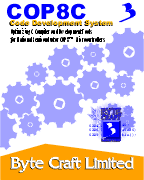- | Home |
- Company |
- Contact |
- News |
- S/ware Eng |
- Standards |
- Academic Support |
- Documents |

- | Requirements |
- Compilers |
- Validation |
- RTOS |
- Analysis |
- Hardware |
- Software |
- Resources |
- Products |
Byte Craft C compiler for COP8

The COP8C Code Development System includes:
-
an optimising C Cross-compiler.
-
the BCLink linker.
-
an Integrated Development Environment and editor.
-
a built-in macro cross-assembler.
Memory Management
New Memory Management techniques, such as the SPECIAL memory directive, add support for variables in all types of memory: available LCD controller RAM, I2C, EEPROM and Flash. LOCAL address space lets you maximize the use of RAM, direct the placement of local variables, re-use RAM locations and pass multiple arguments to functions
Features in Detail
Other features of the COP8C Code Development System include:
-
Highly optimised generated code. Full versions generate ROMable code, demonstration versions generate listing files with assembly.
-
part-specific header files describe the unique features of each target device.
-
compiler configuration using #pragma directives.
-
ports are declared and protected using the #pragma port series of directives
-
the #pragma vector directive specifies the location and assigned name for interrupt sources.
-
BCLIDE Windows IDE organizes access to project settings and facilitates quick project build.
-
BClink Linker links object files and libraries compiled with cop8c.exe
-
object libraries can be included directly in C source files using Absolute Code Mode.
-
named address spaces support the grouping of variables at specific memory locations.
-
SPECIAL address space declares variables at special locations such as external devices or internal EPROM.
-
LOCAL address space allows you to use local variables.
-
extensions to the C language designed specifically for the embedded systems developer. Some extensions include bit-sized data types, binary constants, extended case statements, direct variable placement with the @ symbol, and support for processor-specific functions.
-
interrupt handler support in C; makes context saving and restoring easy.
-
data types include:
bit, bits
char, short, int, long
int8, int16 (unambiguous ints)
register-oriented types for direct access to processor registers when necessary
-
selectable 8 or 16 bit int data type.
-
packed bit fields in structs.
-
include single and multiple lines of inline assembly within a C program with the #asm and #endasm directives
-
extensive control over computer-generated initializations.
-
generates source-level information required for emulators.
-
COP8C extends support for the National Semiconductor COP8™ family of processors including the new SGR and SGE derivatives.
-
support for source-level debugging with popular emulators, or manual inspection using listing files.
-
supports processor specific instructions NOP, STOP
-
supports the instruction extensions 888, 820, 840, 800, 880, and SREG
-
direct access to AC, B, X, PSW and S registers
-
source level debugging supported by MetaLink's emulators
.
